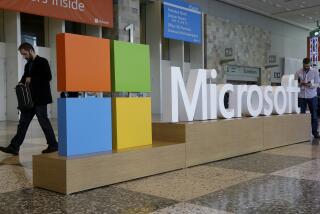Private Company to Charge $50 for Internet Domains : Technology: The annual fee would not apply to individual users with e-mail addresses. It’s all part of privatization move.
- Share via
Carrying out another step in its plan to cast the fast-growing Internet adrift in the free market, the National Science Foundation said Thursday it would abandon its $5.5-million subsidy of the cataloguing of Internet addresses.
As a result, commercial entities and nonprofit organizations will have to pay a $50 annual fee to maintain their Internet domain--the string of characters that represents identity in cyberspace.
The charge will be levied against new enterprises when they sign up for an Internet site and existing Internet users on the anniversary of their registration.
The charge will not apply to individuals. For instance, a person with the electronic address of JohnDoe@aol.com would not have to pay a fee. But America Online Inc., represented by the initials aol.com, would pay one $50 fee to cover the connection to the Internet it supplies to John Doe and millions of other people.
The NSF will continue to pay the registration fees of government and military agencies, schools and universities.
Collecting the money is Network Solutions Inc., a Herndon, Va., company hired by the NSF in 1993 to be the official registrar of the Internet. Since that time, the NSF has paid a fee to Network Solutions each time a new enterprise has connected to the data network.
That was no trouble when only 400 new sites were connecting per month, which was the case in early 1993. By October, 1994, there were 2,000 new sites per month, and the figure should reach 20,000 per month by the end of this year.
“We can no longer afford this,” said Beth Gaston, spokeswoman for the National Science Foundation, an agency that distributes federal research funds.
There are now more than 110,000 domain names in the registry at Network Solutions.
“We don’t expect the $50 is significant enough to cause any real change in the Internet,” said David Graves, business manager for Network Solutions.
The company will keep 70% of the annual fee that is charged to registrants.
The rest will go to a committee that will appropriate it to various entities for improvements to the network.
The NSF and Network Solutions decided to have the change take effect as soon as it was announced to avoid a “land rush” situation in which organizations hurried to connect and register while the government was still paying the fee.
The action is the latest by the NSF to reduce the Internet’s reliance on federal dollars. This spring, the technical backbone of the data network was shifted from computers and communication lines maintained by the agency to those run by private businesses, including MCI Communications Corp. and Sprint Inc.
The Internet is rooted in a government effort that began in the late 1960s to connect data lines of its research laboratories and the military with colleges and universities.






